14 Authentic Lebanese Breakfast Dishes + Spice Guide! (2025)
Engulf your senses with the tastiest, healthiest, traditional Lebanese dishes for breakfast. This curated list from a Lebanese local includes the most authentic recipes so you can make them at home yourself!
Lebanese food is all about sharing, so let me share my favorite dishes and a complete Lebanese spice guide!
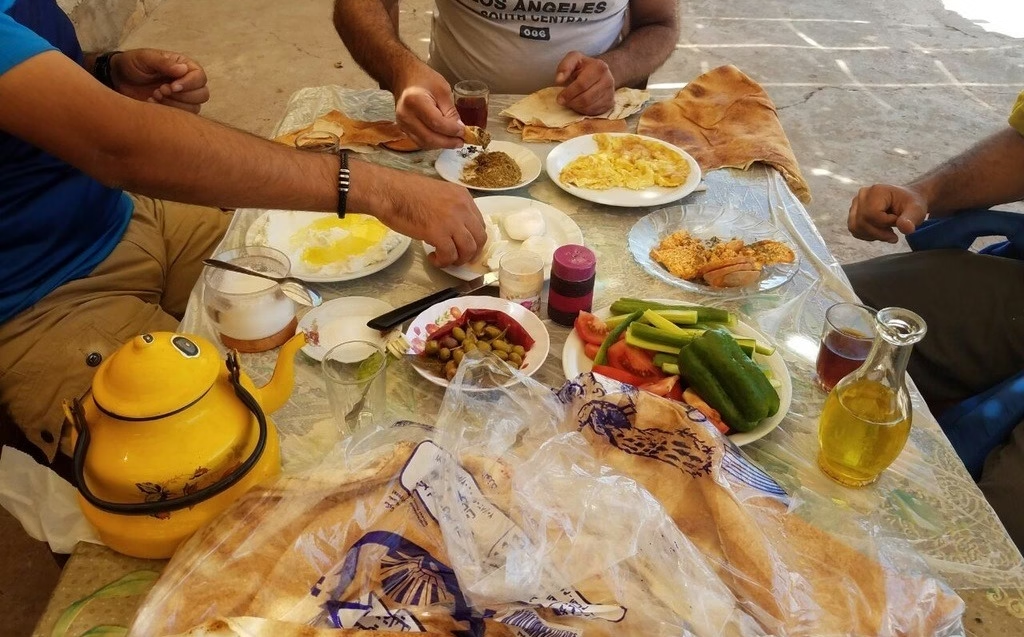
Looking for traditional Lebanese breakfast dishes? I’ve got you covered!
As a lifelong lover of all things Lebanon and a self-considered local to this gorgeous country, I’ve got all the Lebanese breakfast ideas you’ll ever need.
I lived in Lebanon and go there every year, so I know all about how good the food is.
Lebanese food is, in my opinion, the absolute BEST in the world. It caters for every taste and diet and, if it’s done right, you’ll never want any other kind of breakfast.
I’ve sorted this post by eggs, dips, sweet breakfast, bakery, and a full Lebanese breakfast mezze option for when you’re entertaining – or just feeling fancy. Take your pick!
Here’s a full list of Lebanese spices & ingredients you’ll need to make the perfect Lebanese breakfast:
Seven Spice – also called baharat, the perfect blend of spices essential for Lebanese dishes
Zaatar – a green or red spice made from dried thyme, sumac, & sesame seeds
Cumin – a warm & earthy spice that compliments seven spice
Sumac – sweet and tangy, sumac is the perfect addition to your breakfast eggs
Aleppo Pepper – a mild chilli flake with a slightly fruity aroma
Rosewater – not exactly a spice, but a necessity for sweet Lebanese breakfast treats
Pomegranate Molasses – a common ingredient with a tangy flavor, perfect for drizzling
Tahini Paste – used to make hummus, fatteh, salad dressings, and so much more
Foul – a healthy combination of chickpeas and fava beans
Labneh – the perfect strained yogurt for dipping
Makdous – preserved aubergines stuffed with walnuts and deliciousness
Arabic Coffee – the best Arabic coffee is Najjar, which is super rich and strong
Want the ultimate Lebanese recipe book? The Lebanese Cookbook by Salma Hage is a beautiful addition to any kitchen!
1. Eggs

1.1 Fried eggs with sumac
As far as simple breakfasts go, this is it!
A typical Lebanese breakfast for simple, everyday moments, it’s as easy as frying up a bunch of eggs with a sprinkling of sumac. Find sumac here at a great price!
It’s quick, it’s easy, and it’s delicious! I discovered this on a trip to Lebanon, and I couldn’t believe how something so simple could be so delicious. Now we have it all the time!
Fun fact – sumac is jam packed with health benefits! Think anti-inflammatory, anti-microbial, and pro-muscular strength 🦾
You can also use sumac for salads!
1.2 Eggs with labneh
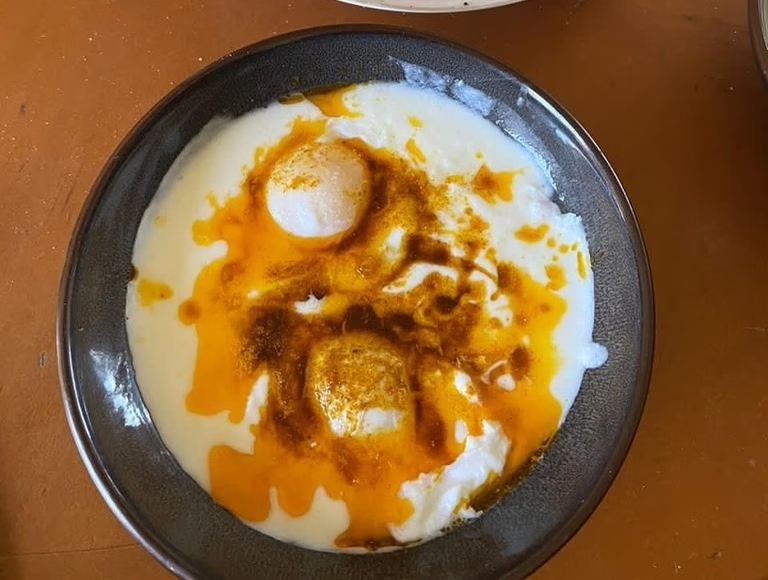
The base of this is technically Turkish – but anything goes when it comes to labneh!
Labneh is different from standard yogurt. Labneh is the product of straining yogurt to the point of total submission! All the whey is removed in the straining process to form a much thicker version of yogurt, kind of like cream cheese. And it’s delicious!
Sounds like your jam? Poach 2 eggs and eat them with a generous serving of Labneh and minced garlic. That’s my favorite way to do it!
If you’re feeling extra fancy, get some chili oil on there!
1.3 Eggs with awarma
This is one of THE most popular breakfast dishes in Lebanon, and it’s easy to see why!
Awarma is lamb confit! It’s basically been cooked with a TON of fat, which sounds weird, but it makes it truly delicious. Don’t knock it til you’ve tried it!
Before I had awarma, I thought the concept was really gross. But actually, it was so good – and makes for the perfect brunch. It may not be ideal if you’re on a diet!
1.4 Shakshuka
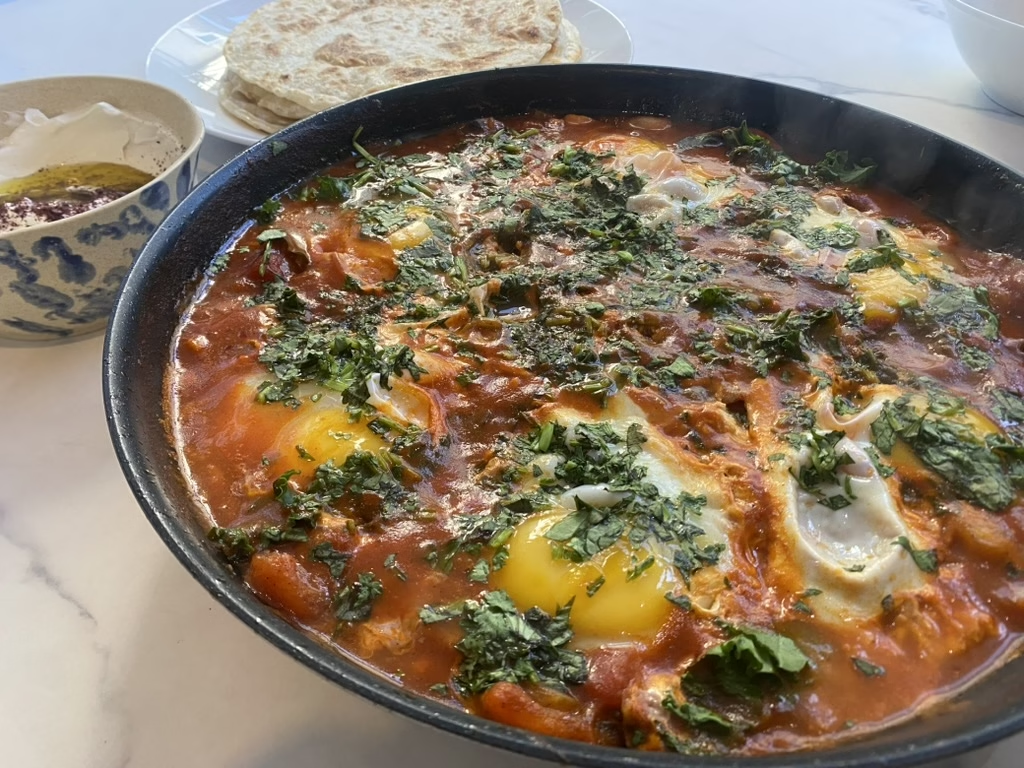
Shakshuka entered the Levant from North Africa, and it’s more popular in Palestine than Lebanon, but it’s a favorite in many Lebanese restaurants in Beirut. So I just had to include it!
Shakshuka is a tomato-based sauce with dreamy poached eggs cooked right in the sauce. In my humble opinion, it’s one of the best (and healthiest) breakfasts you can eat.
The best recipe I’ve found is from RecipeTin Eats. Nagi is such a great recipe source for almost anything! You can also alter the ingredients to make a green shakshuka with vegetables, or add some Soujouk (spicy sausage) for a real Lebanese taste!
My favorite secret ingredient for shakshuka is Aleppo Pepper, which is basically chilli flakes with a slightly sweet aftertaste. You can use it for so many things, I highly recommend having some in your cupboard.
2. Dips & laban
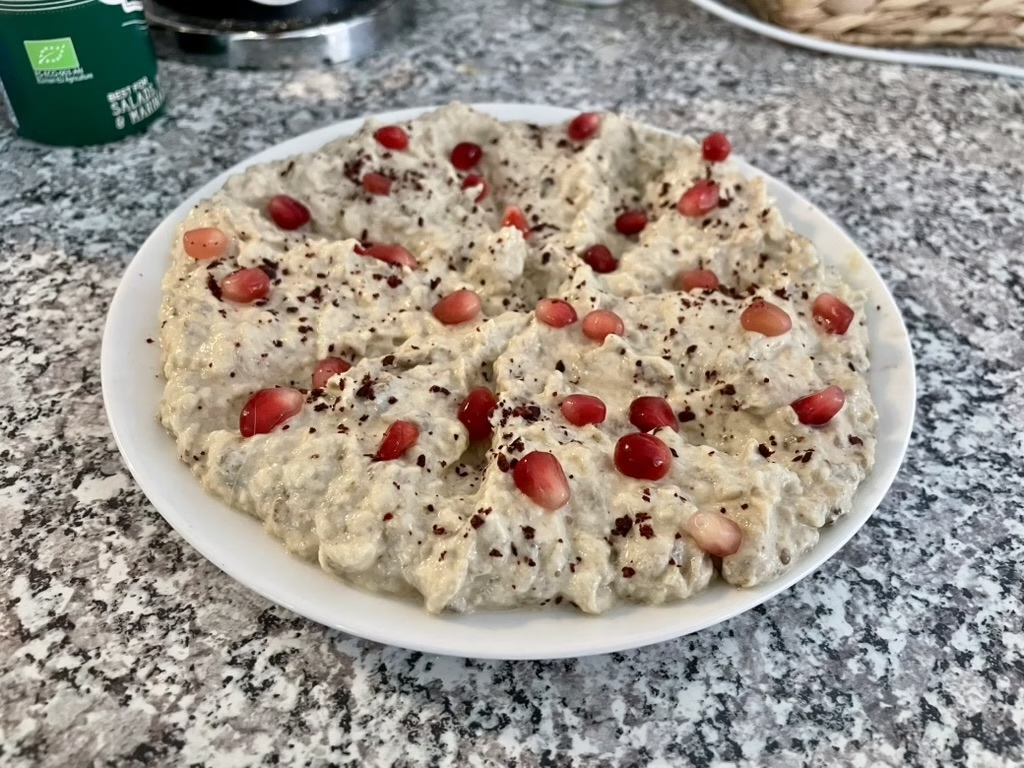
2.1 Fatteh
Fatteh is one of my husband’s favorite dishes. This Middle Eastern brunch dish consists of yogurt, tahini, spiced chickpeas, deep fried pitta, and whatever topping you desire!
My husband loves eggplant and pine nuts as his topping, but you can also top it with minced meat, pomegranate seeds, flaked almonds or whatever else you fancy!
I always get the lighter version of tahini, not the dark tahini, as it’s smoother and much easier to work with. I once tried to make it with grainy tahini and it turned out super bitter. Learn from my mistakes!
2.2 Foul medames
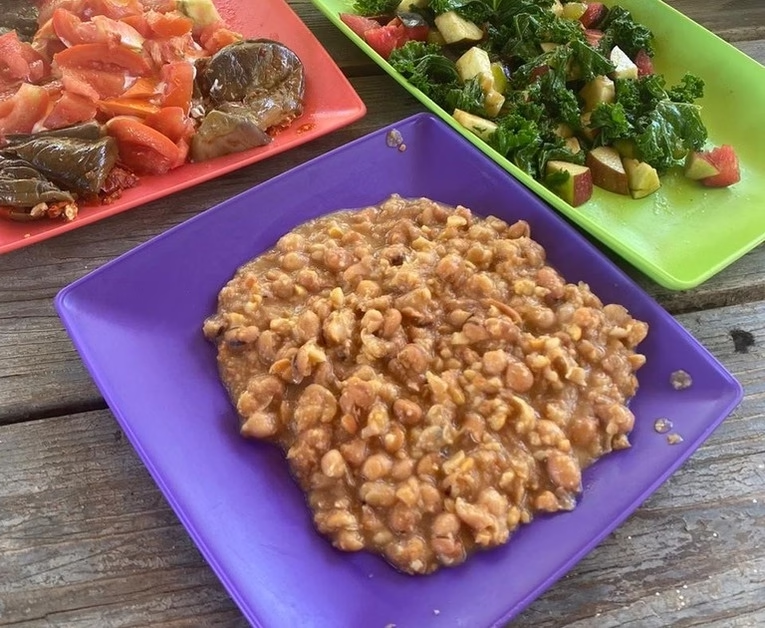
A gorgeous savory dish made from fava beans and chickpeas, this is the BEST breakfast.
Bonus? It’s super easy to make!
Foul (pronounced fool) most often comes ready in a tin. You can find it in most Middle Eastern stores, and it’s either fava beans on its own or mixed with chickpeas. Go for the chickpeas if you want that extra protein!
Fava beans, also known as broad beans, are an excellent breakfast choice to aid your digestive system. They’re super rich in folate, which helps the production of red blood cells which, in turn, help your blood transport oxygen around the body. Neat!
It’s as simple as throwing the contents of the tin into a small saucepan, mashing it down a bit with a fork as it cooks, then drizzling salt and extra virgin olive oil over the top.
Before I tried it, I thought foul looked disgusting – but it’s got such a deep flavor, and it’s actually delicious, so don’t knock it til you try it, trust me.
2.3 Hummus
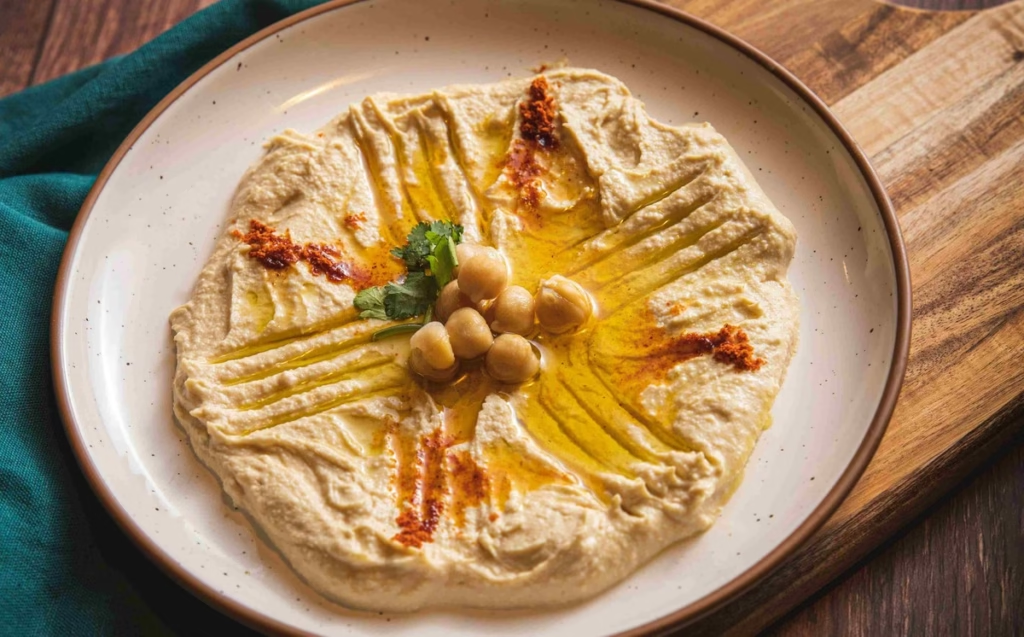
Okay guys, this Middle Eastern food is super basic. Everybody knows about hummus. However, it’s arguably the most important part of your breakfast.
Best way to make hummus? Check it out:
- Drain 1 can of chickpeas and throw them into a food processor
- Drizzle with olive oil, lemon juice, 1 large garlic clove and salt
- Add a tablespoon of tahini and 2 ice cubes
- Whiz it up! While you’re whizzing, drizzle more olive oil in through the hole in the top until you reach a creamy consistency
It’s really that easy. Just don’t forget the ice cubes – they help with the consistency!
I make hummus every week for our mezze dinners at home. It’s so good and goes with literally everything. It takes so little time and much cheaper to make than buy, which is why we have it so often!
The best tahini to use is this one, it’s smoother than most!
2.4 Labneh
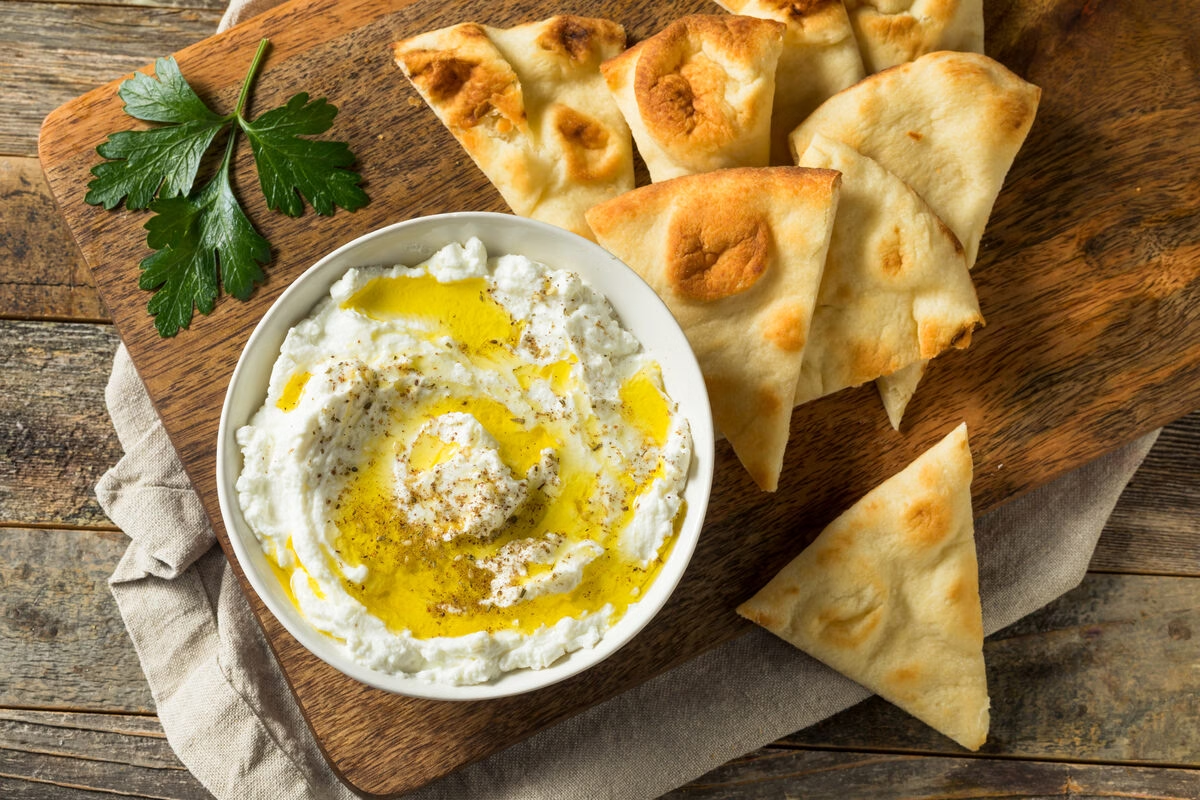
We’ve talked about labneh above, but having it on its own with some dippers (like cucumber and carrots) is the ULTIMATE way to enjoy it.
Throw it in a dish, use the round of a spoon to make a pretty pattern, and drizzle olive oil over the top.
My friend Viviane taught me how to make labneh. It’s so simple if you have a cheesecloth – just takes about 7 hours of straining while you go about your day – but most people I know would prefer to buy it.
Don’t forget to add fresh mint and sumac for an authentic twist!
2.5 Makdous

Another of my husband’s favorites, makdous is basically just preserved baby eggplants stuffed with red pepper, garlic, chili, and walnuts.
Preserved in olive oil, these are a classic side dish to eat with labneh!
They’re tough to find if you don’t live next to a Middle Eastern store – but thankfully, you can find them on Amazon!
3. Sweet breakfast

3.1 Knafeh
Anyone who tells you that you can’t eat sweet things for breakfast shouldn’t be allowed to talk to people.
Knafeh (the ULTIMATE hangover breakfast) is not for the faint of heart. Cheesy, carby, sweet, and savory all at the same time, this will have your heart in no time.
Making knafeh from scratch is no easy feat (especially if you want to get it exactly the way they serve it in Lebanon) but if you’re up for the challenge, go for it!
Otherwise, if you live near a Middle Eastern store they may have knafeh in their bakery section!
Every time I go to Lebanon, I have knafeh in a bread bun, which is the traditional way it’s eaten in beirut. – I personally think the bun ruins it, but it’s still so delicious!
3.2 Arisheh
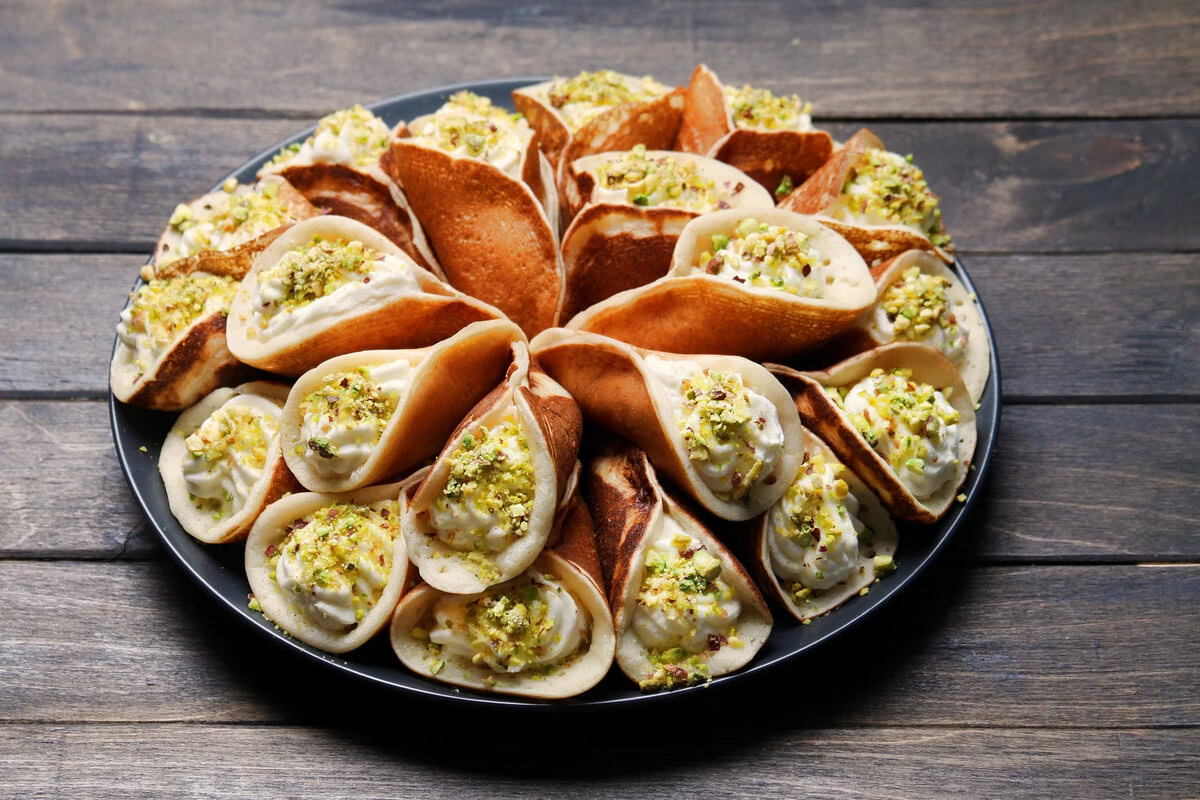
Are you a fan of sweet and savory? Arisheh is the star of the show!
I recommend making arisheh as part of atayef, which is a folded, stuffed pancake super popular during Ramadan.
A fantastic recipe for arisheh can be found here. It’s pretty simple to make, and with a drizzle of honey and orange blossom water you’ll be in sweet breakfast heaven!
Arisheh is pretty close in flavor to ricotta! You can enjoy it any way you want – with fried pitta and vegetables, on a pizza, in a bun, or just on its own with a spoon.
4. Bakery
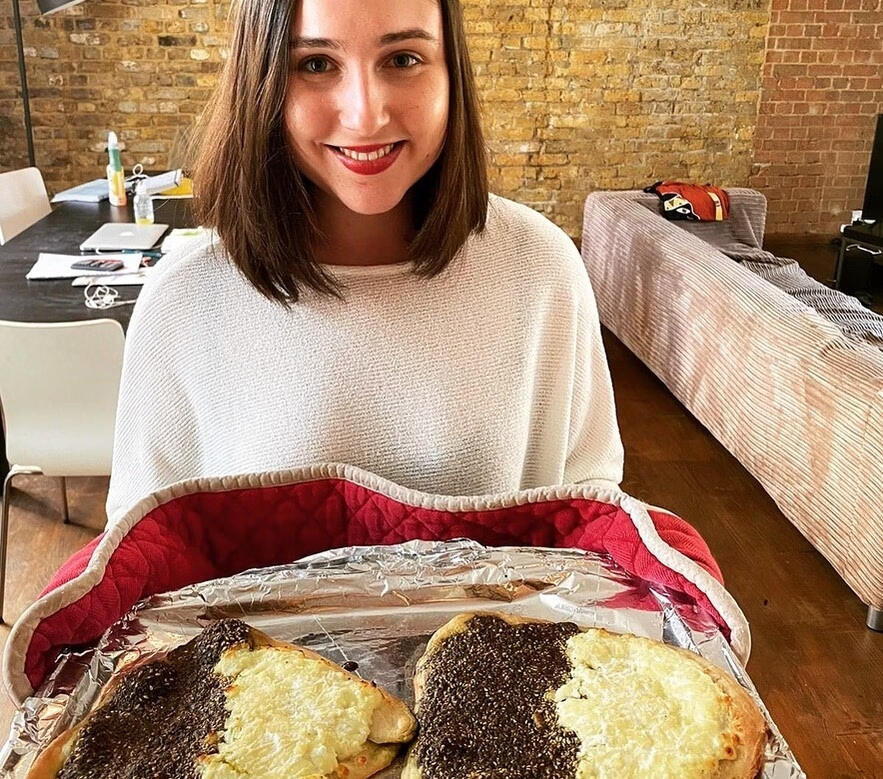
4.1 Manakeesh
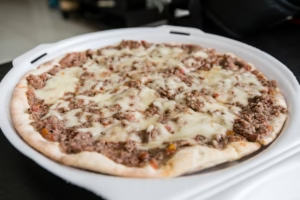
This is my favorite part of any breakfast. Manakeesh (pronounced mana’eesh and the plural of man’oucheh) are simple, cheesy goodness and you can’t possibly enjoy a real Lebanese breakfast without it!
It’s similar to a calzone but the flatbread dough is super fluffy, and it’s typically enjoyed with zaatar and cheese, olives, fresh mint, tomatoes, and cucumber.
You can also have cheese and turkey, cheese and soujouk, kishk, or anything else your heart desires.
It’s hard to make it from scratch if you want it to be super authentic – the recipe is coveted by local bakeries in Lebanon and I’ve yet to find a recipe online that truly emanates the real experience.
If you want the real thing, go to Lebanon! Follow my awesome guide on solo travel in Lebanon here, where I show you all the top hacks for your trip!
A similar breakfast is saj, a thin flatbread cooked on a circular metal stone. If any of your local Middle Eastern stores have it, try it!
4.2 Mouajanat

Mouajanat is basically an assortment of savory breakfast bakes.
It can include fatayer (spinach rolls), cheese rolls, sambousek (mini meat pasties), sfeeha (open meat pies), and lahm baajin (ground meat with parsley and tomatoes on flatbread).
You can choose 2 or 3 of these and have these along with your Arabic coffee (the best of which is Najjar, get some here!)
They’re all delicious – cheese rolls are my personal favs, the most delicious of all Lebanese cuisine!
My mother-in-law makes the most incredible fatayer. Every time we go to her house she makes them, and although I don’t typically like spinach, these are honestly the best.
Maureen Abood makes the most authentic fatayer – check out her recipe here!
4.3 Ka’ak with tea or milk
These are GLORIOUS and my husband is always raving about them. Typically more popular in Syria, ka’ak sticks are essentially just…Lebanese breadsticks. Dip them in sweet tea and you’ve got yourself a Sunday morning treat!
Ka’ak, on the other hand, is basically a type of bread, or pita bread. It usually has a hole in the middle and is baked with sesame seeds
Ka’ak is shaped like a handbag so that it can hang up to cool after it’s baked! It’s so crunchy and delicious!
I highly recommend buying sweet tea for this treat, the best of which is Sadaf Tea! Get some Sadaf here.
Mezze board

A full Lebanese breakfast mezze board is essential if you’re entertaining. It’s a great option for feeding big groups of people!
It’s also a great option for those who just can’t choose which Lebanese breakfast food to enjoy. I disagree with the masses – you CAN have your ka’ak and eat it too!
Here’s a list of what I would put on my mezze board for the best Lebanese breakfast of your life:
- Lebanese or Turkish coffee (my favorite is Najjar)
- Labneh
- Hummus
- Manakish
- Fatayer
- Eggplant fatteh
- Eggs awarma
- Lebanese Olives
- Knafeh
Lebanese olives are a bit different from your typical Italian or Greek olives. They’re actually preserved in olive oil rather than brine, and they’re much more sour. For me, this makes them taste even better!
My husband’s family has a little olive grove at the back of their house near Saida, and every year they harvest the olives in HUGE tubs – the most exciting time of the year! They last for ages, so we always seem to have olives in the house, and they’re honestly so delicious!
FAQs about traditional Lebanese breakfast dishes

🇱🇧 What is traditional Lebanese breakfast?
A traditional Lebanese breakfast consists of Labneh, ka’ak, eggs, makdous, and something yummy from the bakery. There are so many options to choose from, but check out all the stuff you need for a Lebanese brekky in this post!
🍜 What is fatteh?
Fatteh is a Lebanese dish with yoghurt that’s traditionally eaten with chickpeas and spices. It’s delicious! If you want an amazing recipe, I recommend buying Salma Hage’s Lebanese Cookbook!
🥫 What are 4 dishes traditionally eaten in Lebanon?
Tabbouleh, hummus, kibbeh, and fattoush are traditionally eaten in Lebanon. All delicious!
🇱🇧 What is foul?
Foul is fava beans and chickpeas! SO delicious and healthy!
🍳 Do Lebanese people eat shakshuka?
Yes! You won’t find shakshuka everywhere in Lebanon, as it’s traditionally a Palestinian dish, but people still make it at home all the time.
🍲 What is Lebanon’s most famous dish?
Lebanon’s most famous dish is hummus! Kibbeh, grilled meats, and baked goods (like manouche) are also pretty famous! This is why the Middle Eastern diet is so damn good!
🍆 What are the best vegetarian Lebanese breakfast dishes?
If you’re a vegetarian looking for Lebanese breakfast dishes, I’d go with fatteh! Fatteh is perfect for vegetarians, super healthy, and the perfect way to start off the day!
🥗 What are the most healthy Lebanese breakfast dishes?
The healthiest Lebanese breakfast dishes are fatteh and foul. Fatteh has a ton of protein, and foul is rich in folates! Baba ganoush isn’t a breakfast dish, but you can certainly eat it any time of day and it’s super healthy. I make it all the time!
🇬🇷 What is the difference between Greek and Lebanese food?
The biggest difference between Greek and Lebanese food is the spice palate. Lebanese dishes use a different set of spices and they also use a lot more legumes like chickpeas and dried fava beans!
Conclusion
There you have it! The ULTIMATE list of traditional Lebanese breakfast dishes to blow your mind – and morning!
I’ve also included a few easy Lebanese breakfast recipes for you to try – I recommend you take the challenge! And if this has inspired you to taste more Lebanese food, don’t forget to check out my travel itinerary for the ULTIMATE 3 days in Beirut!
We make Lebanese breakfast all the time at home because my husband misses his home country, so it’s our favorite comfort food. It’s perfect for sharing and making memories together.
If you have any questions just let me know in the comments! I’d be happy to help, and if you have any recommendations of your own, I’d love to hear them 😁
Happy eating, habibi!
Lizzie
Related posts:
16 gorgeous, hidden romantic places to visit in Paris from a local (2025 update)
Your ULTIMATE guide to skiing in Austria + resorts & hotels
Spend 4 days in Edinburgh with our full itinerary + where to stay!
The best itinerary for spending a weekend in Salzburg & a FREE PDF!
11 solo travel tips for introverts + safety checklist to make every trip amazing
18 super magical hotels near the Christmas markets in Vienna

Fatteh is my fav ✨
There is definately a lot to find out about this subject. I like all the points you made
very informative articles or reviews at this time.
Yummy! I’ll have to try some of these, thanks Lizzie